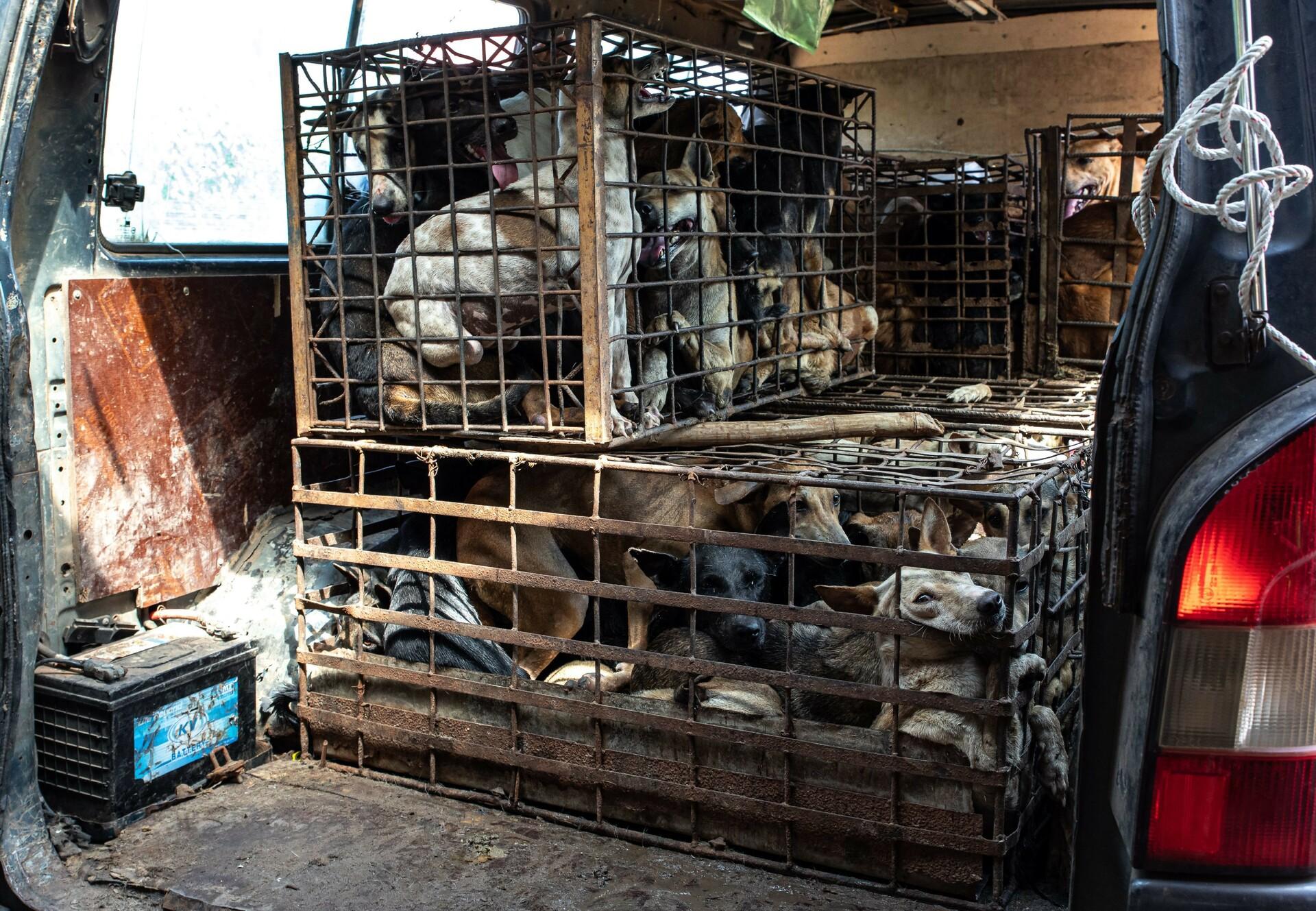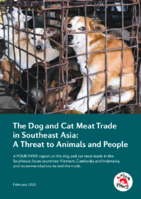
Ten Million Dogs and Cats are Slaughtered for their Meat in Southeast Asia Yearly
According to new FOUR PAWS report, trade continues to thrive despite severe risk to public health
11 February 2020 – Current research and investigations by global animal welfare organisation FOUR PAWS paints a shocking picture: In Vietnam, Cambodia and Indonesia alone, an estimated ten million dogs and cats are brutally slaughtered every year for consumption. While the practice of eating dog and cat meat is not illegal, the way the animals are sourced and slaughtered often is. In many cases, these dogs and cats are pets that are stolen from their owners and then drowned, hung, burned alive or stabbed, making the dog and cat meat trade one of the biggest animal welfare issues in Southeast Asia. FOUR PAWS also warns of its serious human health risk, with the uncontrolled spread of rabies being only one of them. In addition, the animals are often sold at live animal markets – the place of origin of the Wuhan coronavirus.
Dog and cat meat is available in restaurants and markets, whose visitors are mostly locals, but may also include tourists, especially from China and South Korea. The trade and consumption not only cause immense suffering for animals and their owners, but also pose considerable health risks.
High demand for dog and cat meat in Vietnam
According to FOUR PAWS investigations, an estimated five million dogs and one million cats are slaughtered for their meat each year in Vietnam. A kilo of dog meat brings between €6 and €9. Cat meat can cost up to €11 per kilo – in the case of a black cat even up to €20. Vietnamese men are the main consumers of dog and cat meat. Among them there is often the perception that the meat has healing properties. Demand is particularly high in the north of the country. The FOUR PAWS study shows that 60 percent of the locals in Vietnam's capital Hanoi have eaten dog meat at least once in their lives. However, 44 percent of respondents in Hanoi indicated that they would refuse dog meat in the future. Dog and cat catchers routinely collect pets and strays in the south of the country and transport them for over 18 hours without water or food to Northern Vietnam. To satisfy the appetite for dog and cat meat, animals are also imported from China and Laos. Clashes – sometimes fatal – between pet owners and dog and cat catchers have recently become more frequent in Vietnam, with a rapidly growing local opposition to the trade from pet owners and the younger generation.
Cambodia's capital Phnom Penh as dog meat hotspot
In neighbouring Cambodia, the situation is similarly tragic for animals. FOUR PAWS’ research shows that around three million dogs are killed and eaten in the Kingdom of Cambodia every year. Among the slaughtered animals are stray animals, but also pets that are either stolen, exchanged for pots and pans or sold by their owners. A live dog brings between €1.80 and €2.70 per kilo, while a kilo of raw dog meat can be bought for up to €3.60. A dog meat dish costs less than €1. In the Cambodian capital Phnom Penh alone, FOUR PAWS has documented over 110 restaurants selling dog meat, most of which opened within the last two years. Perhaps most shocking, drowning pits are routinely used in the slaughtering of dogs, with many slaughterhouses processing over 100 dogs per day. Although the trade is flourishing, the consumption of dog meat remains a controversial practice among Khmer people, especially the younger generation.
Dogs and cats deliberately tortured in Indonesian live animal markets
In Indonesia, consumers of dog and cat meat are a minority of the population. According to the FOUR PAWS report, less than seven percent of Indonesians eat this type of meat. Nevertheless, around one million dogs and hundreds of thousands of cats are killed for the meat trade every year. Dog meat hotspots in Indonesia include the islands of Java, Sumatra and Sulawesi. In North Sulawesi, at so-called “extreme markets”, popular with tourists, the animals are sold and blowtorched alive in full view of onlookers. For a live dog one pays around €13. A ready to serve dog meat dish, usually in the form of a curry or soup, costs about €1.30.
FOUR PAWS’ fight against the dog and cat meat trade
In order to put a sustainable end to the brutal dog and cat meat trade in Southeast Asia, FOUR PAWS has launched a campaign on an international and national level. Through educational work and cooperation with the responsible authorities and tourism associations, the goal is to get governments in Southeast Asia to introduce animal protection laws which bring an end to the capture, slaughter and consumption of dogs and cats. Furthermore, FOUR PAWS supports local animal welfare organisations and communities with humane and sustainable stray animal care programmes. FOUR PAWS is also part of the animal welfare coalitions DMFI (Dog Meat Free Indonesia) and ACPA (Asia Canine Protection Alliance), which lobby against the trade in Southeast Asia.
In addition, FOUR PAWS has launched a petition against the dog and cat meat trade, which has already been signed by over half a million supporters worldwide since it launched late last year: https://help.four-paws.org/en/end-dog-and-cat-meat-trade-southeast-asia
Read our report here:

Deidre Daniels
Public Relations Officer+27 (0)21 702 4277
+27 (0)78 675 8220
9B Bell Crescent, Westlake Business Park,
Green Building, Cape Town, 7945
A Public Relations professional with over eight years’ experience in fostering positive relationships between organisations and media.
FOUR PAWS in South Africa on Social Media
Stay up to date on this topic and on all FOUR PAWS activities on our social media channels:
or subscribe to FOUR PAWS in South Africa newsletter.
FOUR PAWS is the global animal welfare organisation for animals under direct human influence, which reveals suffering, rescues animals in need and protects them. Founded in 1988 in Vienna by Heli Dungler and friends, the organisation advocates for a world where humans treat animals with respect, empathy and understanding. The sustainable campaigns and projects of FOUR PAWS focus on companion animals including stray dogs and cats, farm animals and wild animals – such as bears, big cats and orangutans – kept in inappropriate conditions as well as in disaster and conflict zones. With offices in Australia, Austria, Belgium, Bulgaria, Cambodia, France, Germany, Kosovo, the Netherlands, Switzerland, South Africa, Thailand, Ukraine, the UK, the USA and Vietnam as well as 13 wild animal sanctuaries and cooperation projects across the globe, FOUR PAWS provides rapid help and long-term solutions. www.four-paws.org.za

